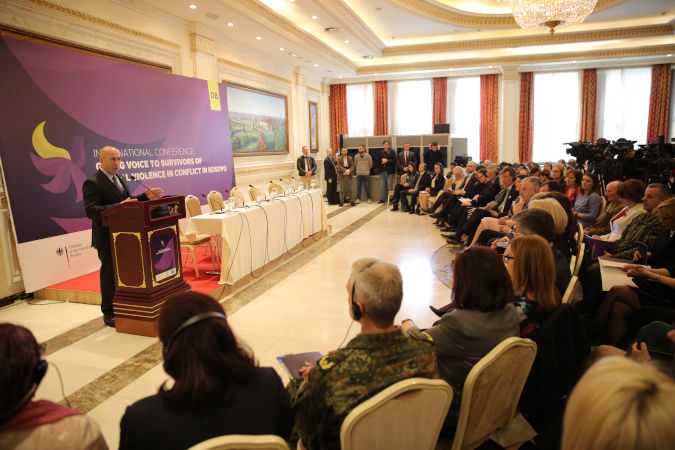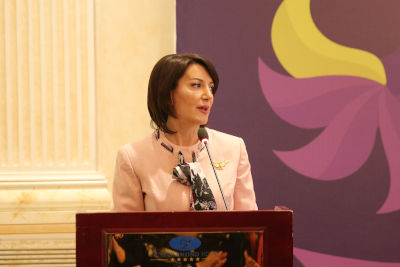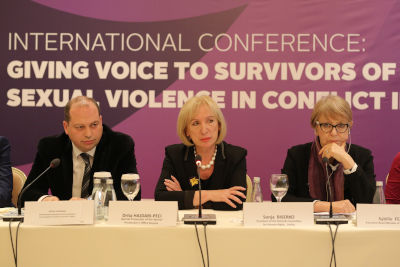Shining a light on conflict-related sexual violence in Kosovo
On International Women’s Day, 8 March, in Pristina, an international conference gave voice to survivors of conflict-related sexual violence (CRSV) in Kosovo.Date:

Organized by the Jahjaga Foundation with the German Embassy, UN Women and the UN Kosovo[1] Team, the conference not only served to shine a light on some of the darkest corners of human experience and share painful truths of conflict-related sexual violence, but also aimed to inspire global collaborations as everyone has a critical role to play in helping change social norms, traditions and laws that have silenced survivors.
Former President of Kosovo, Atifete Jahjaga, founder of the Jahjaga Foundation, urged everyone to “be there for the survivors and provide support during their long road of accessing justice – survivors are so much more than what happened to them.”

The Prime Minister of Kosovo, Ramush Haradinaj, said: “[It is necessary to] deal with the past, including the healing of the wounds of conflict-related sexual violence, so that we’ll never experience such tragedy again. [We must] cooperate with all parties and learn from others in order to heal the wounds.”
Christian Heldt, Ambassador of Germany, called for accountability and assistance, guided by the principle that “Survivors should not go through these horrors again and have their fate put in question once more. They should be assisted in every possible way, in a timely manner.”
Ulrika Richardson, UN Development Coordinator, called for global joint action: “For all survivors of sexual violence in conflict around the world, it is our duty to do everything in our power to recognize their right to a life in dignity, to lift the veil of invisibility and shame, to replace impunity with justice, and indifference with action.”
In a video message, Pramila Patten, Special Representative of the UN Secretary-General on Sexual Violence in Conflict, said: “The only shame of rape is in committing, commanding or condoning it. [We call] upon public institutions and society to continue to strengthen tools to repair the dignity of survivors by increasing social protection and opportunities to partake in the society.”
Vlora Nushi, UN Women Kosovo Head of Office, read a letter by 2018 Nobel Prize Laureate Nadia Murad, which emphasized that sexual violence knows no geographic bound: “Providing reparations to survivors of sexual violence is a moral imperative that needs to be recognized globally by our collective conscience.”

Two panel discussions followed, putting survivors and their condition at the center, and serving to stimulate public discourse on sexual violence as a weapon of conflict, which continues to impact all communities and genders in Kosovo even two decades after the end of the hostilities. The panelists, sharing their perspectives and insights into their work, included Ministers from key ministries in the provision of financial reparations for survivors of CRSV, Prosecutor of the Special Prosecutor’s Office, and civil society organizations specialized in working on CRSV and with survivors.
Shpend Haxhibeqiri, Member of the Commission for the Verification and Recognition of CRSV Survivors, shared the difficulties that the Commission faces regarding the verification process of CRSV survivors’ applications, and highlighted the role of UN Women as continuous key supporter in this challenging process.
The voices of survivors were heard by the audience through their anonymous testimony, thereby contributing to increasing the awareness on CRSV and ultimately to ending sexual violence as a weapon of war.
The event concluded with the ‘Pristina Communiqué, read in the name of survivors of conflict-related sexual violence aiming to take the survivors’ perspective, demands and needs to the global level.
[1] All references to Kosovo on this website shall be understood to be in full compliance with UN Security Council Resolution 1244 (1999).